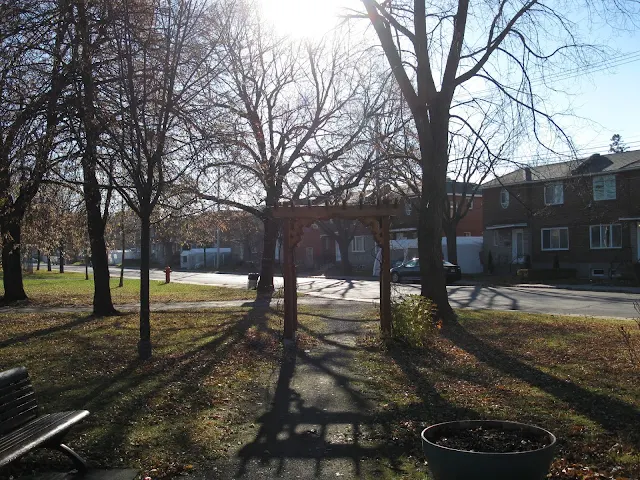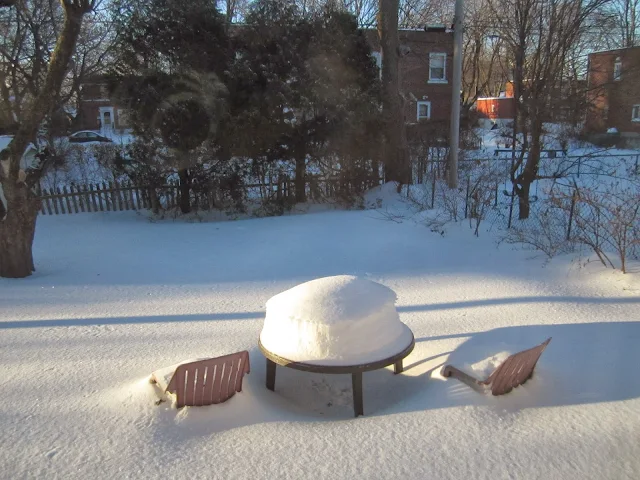Champlain College, St. Lambert Campus
Here is one of my last social engagements, my speech at the retirement party for my friend Paul Leblond hosted at the home of our colleague Susan Woodruff. I loved teaching and I loved socializing at our office, we had a great long run with both! But everything comes to an end.
RETIREMENT SPEECH FOR PAUL LEBLOND
I taught at Champlain College from November 1976 to January
2012.
For most of that time I shared an office with Susan, John,
and Paul.
I can honestly say I never went to work unhappy that I had
to be there. I always loved teaching, the students, and the three people with
whom I shared an office.
I met Susan first because she was on the hiring committee
when I was interviewed.
View of the Jacques Cartier Bridge from our office window
A week after I was hired and sitting in my tiny first floor
office, John (who I'd never met before), came and welcomed me to the college.
A few weeks later I met Paul at a department meeting at the home of Ricky Zurif, our department head. It was evening
and Paul came running in when the meeting was almost over, he was breathless and
animated, he'd been to a political
demonstration and he had lots to say about the demonstration still going on in
the streets.
It was always lively in that office of ours, you could
depend on it, we talked constantly, whether about Quebec and Canada, American
politics, our students, the administration at the college, teaching, and
schedules that had four hours of back-to-back classes! And when John wasn't
there (he was "off to meet the kiddies" as he sang leaving the
office, to a tune from the Wizard of Oz)
Paul (or "Paulium" as John called him) and I continued to talk. And
talk. And talk.
Few teachers have more students congregate around them than Paul,
these were animated group meetings during which time young people could say
anything they wanted, and some of them probably experiencing for the first time
an adult taking them seriously and listening to what they had to say. It was a
free-for-all for students visiting Paul. Students meeting with Susan all seemed
responsible and charming young women who read Jane Austen and would no doubt go
on to respectable and responsible careers. Students visiting me were more or
less normal people, including one young man who brought along his five foot
tall Italian grandmother who wanted to give me a hug. Paul's students were a motley
crew who sometimes had outrageous opinions. And when they finally left it was
back to work for Paul, he had to organize the half dozen tapes or media he was
bringing to class, photocopy and staple elaborately made hand-outs on green,
pink, or blue paper, and go over his class preps before he left for class. One
semester when Paul's students arrived to talk, this time a particularly loud
and large group, I was happy to go off to the library and work there.
.JPG)
From a classroom window....
Paul gave so much of himself to his students. He is a
genuinely kind and caring person. We often had the same students; I always
recommended Paul's or John's or Susan's classes when students asked me for
advice about the next semester. There was Patrick who had cerebral palsy and was
in a wheel chair. Because of his illness it was difficult to understand what
Patrick was saying but he visited Paul at least once a week for several years.
We'd hear Patrick coming, his voice down the hall, and then he'd manoeuvre his
wheel chair into the office. Patrick relied on Paul's help because no one would
help him as Paul did. Paul was kind and caring to this young person, more than
most people would have been.
Another memorable student was "Big Robert" who
sweated profusely and filled the office with his presence. He was also intelligent
and opinionated, but better to have students with passion and interest who
actually read books and think for themselves than students sitting bored at the
back of the class. Robert went on to earn several graduate degrees including his
PhD and he returned to Champlain to teach for a few semesters. Again he visited
our office and he was as opinionated as ever.
When students would apply to McGill University's medical school, Paul
put in many hours helping each student individually with their applications.
His father, Dr. Charles Leblond, was an eminent physician and medical cancer researcher at McGill and I always enjoyed hearing Paul's stories
of growing up, including visiting, with his two brothers, the morgue at the
McIntyre Medical Building (or some other building at McGill).
And then, every August, Paul would arrive at the office from
travelling somewhere exotic in the world and we all listened to his adventures,
looked at his photographs, and shared his enthusiasm for countries he'd
visited, including over the years India, China, Japan, South America, South
Africa, all across Europe, and numerous road trips by car across North America à la Jack Kerouac! There was always some
curious bit of trivia he'd marvel over, for instance, do you know how many
dozens of flavours of yogurt you'll find in a Paris grocery store? As someone
who prefers to stay at home and read a book, or write a poem, it all sounded
quite fascinating!
 |
| Here is Paul in our office, early May 2011 |
Paul was always kind and compassionate to his students and I
know they responded to this quality in him. They knew he was a good person and
they trusted him, they could rely on him, he brought out the best in them. Paul's
classes and meetings during his office hours provided students with an
environment that gave them the freedom to be themselves, to feel empowered to
express themselves freely. No wonder he was considered one of the best teachers
at Champlain.
And now, on behalf of Paul's colleague's in the English
Department, and especially on behalf of Susan and John and myself, I would like
to congratulate Paul for his many years of dedicated service to the students at
Champlain College and thank him for being our wonderful office mate, a true
friend, and for being himself.
Stephen Morrissey
August 19, 2013
Updated on 22.09.2019, 06.11.2019

































.JPG)
.JPG)
.JPG)






